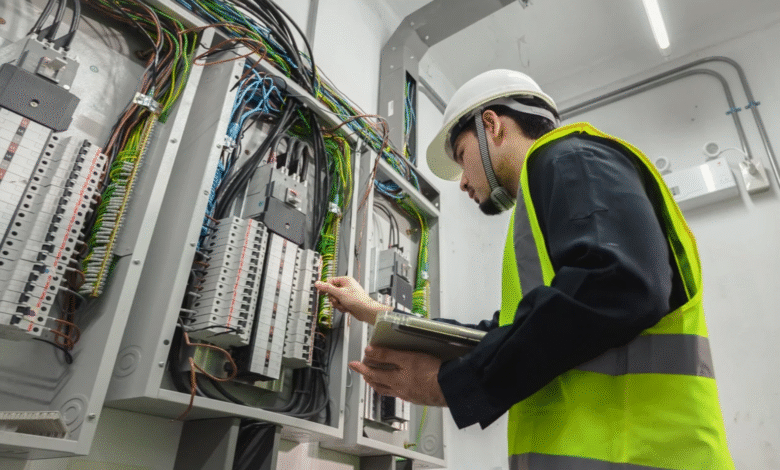Home Is Where the Power Flows: Why Every Homeowner Needs a Trustworthy Residential Electrician

Let’s be honest—most of us don’t give a second thought to the electricity flowing through our walls… until it stops. One minute, your coffee maker’s brewing like a champ. The next? Silence. Maybe the lights start flickering. Or you plug in your new flat-screen, and the breaker throws a tantrum. Suddenly, all that invisible wiring becomes a very real issue.
And that’s where the often-overlooked heroes come in: residential electricians. These are the folks who make sure your home’s heartbeat—the power—keeps ticking without a hitch. They’re not just wire wranglers. They’re safety experts, problem-solvers, and (in more cases than you’d guess) lifesavers.
Beyond the Basics: What Residential Electricians Really Do
We tend to think of electricians as people who install outlets or fix bad switches. But the scope of what a residential electrician handles goes way deeper. Sure, they’ll install that ceiling fan you’ve been meaning to put up. But they’re also the ones behind smart home integrations, EV charger setups, full panel upgrades, whole-house surge protection, and even rewiring century-old homes to meet today’s modern demands.
Think of them as part technician, part detective, part guardian angel for your appliances. They assess load capacities, test circuits, and diagnose strange hums and flickers that can be early warnings for bigger problems. They make the invisible visible—so you can keep living in comfort without ever thinking about what’s hiding behind the drywall.
New Builds, Old Homes, and Every Corner In Between
If you’re building a house from scratch, there’s no question—you need a licensed electrician involved from the jump. But what about that charming 1950s bungalow you just moved into? Or the fixer-upper with outdated wiring and only two outlets per room?
Older homes were never designed for the electrical loads we throw at them today. Laptops, smart TVs, streaming devices, air fryers, chargers for days—modern life demands a lot of juice. Without proper upgrades, you’re not just putting wear on your system—you’re risking your safety.
That’s where residential electricians shine. They know how to bring older systems up to code without compromising the character of your home. They can add circuits, expand your panel, or even rewire entire rooms—all while keeping disruption to a minimum. That’s craftsmanship.
Why DIY Just Doesn’t Cut It
We all love a good home improvement project, but electrical work? That’s not the place to experiment. This isn’t like painting a wall or assembling IKEA furniture. One wrong connection and you could blow a fuse, destroy an appliance, or worse—start an electrical fire.
It’s not just about knowing which wire goes where. It’s about understanding the entire system: load calculations, circuit balancing, grounding, and code compliance. Residential electricians go through rigorous training for a reason. They’re not guessing. They know.
Even something that seems simple—like replacing a light fixture—can go sideways if the original wiring is outdated, brittle, or not grounded properly. Calling in a pro doesn’t just save time. It could save your home.
The Real Value: Peace of Mind
Here’s a thing that doesn’t get said enough: good electricians don’t just fix problems. They prevent them. A qualified residential electrician will spot risks you didn’t even know existed. A double-tapped breaker. A melted wire hidden behind a panel. An outdated GFCI in a bathroom.
These aren’t hypothetical issues. They’re time bombs.
When you bring in a pro for even a small job, they’re not just installing or replacing—they’re evaluating. You get eyes on your system, professional advice, and the kind of reassurance you can’t get from a how-to video.
Choosing the Right Electrician (Hint: It’s About More Than Price)
We get it—price matters. But when it comes to your home’s electrical system, this isn’t where you want to cut corners. The cheapest option today could be the costliest mistake tomorrow.
Instead, look for experience, licensing, and reputation. Read reviews. Ask for references. Talk to neighbors. And don’t be afraid to ask questions when they come out for a quote. A good electrician will answer clearly, confidently, and without jargon.
Bonus points if they explain why they’re doing something—not just what they’re doing. That’s a sign of someone who respects your home as much as you do.
When to Call a Residential Electrician (Besides Obvious Emergencies)
Not sure when to call a pro? Here are a few signs:
- Lights dim when large appliances kick on
- Breakers trip frequently for no clear reason
- Outlets are hot to the touch or discolored
- You still have two-prong outlets
- You’re using a lot of power strips and extension cords
- You’re planning a remodel or adding new appliances
Also, if your home is over 30 years old and has never had an electrical inspection—call. Even if everything “seems fine.” Prevention beats repair every time.
Final Thoughts: The Backbone Behind Every Room in Your Home
Electricity isn’t just about function—it’s about comfort, safety, and quality of life. Every time you flip a switch or charge your phone or curl up with a movie on a stormy night, you’re relying on a system that needs to be designed, installed, and maintained by someone who truly knows their stuff.
That’s the heart of what residential electricians do. They bring order to the chaos behind the walls. They protect what matters. And they make modern life feel effortless—even though it’s anything but.
So whether you’re upgrading your kitchen, prepping for hurricane season, or just tired of that one flickering light that makes your living room feel haunted—don’t wait. Call someone who can make it right.
Because at the end of the day, a well-wired home isn’t just more functional—it’s more livable. And that’s something worth investing in.




